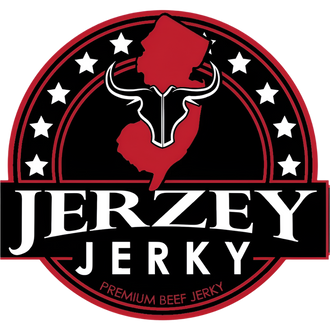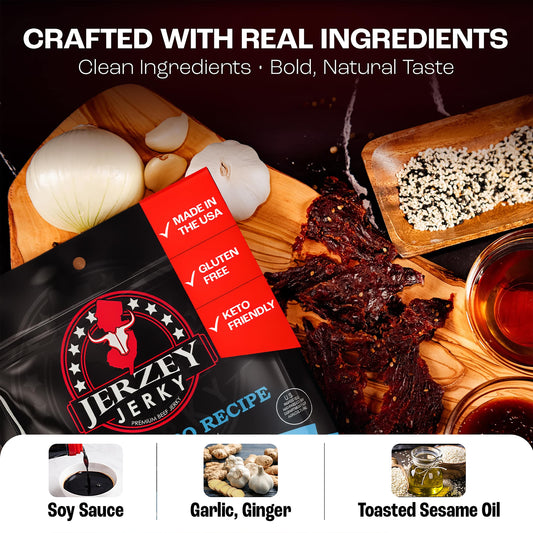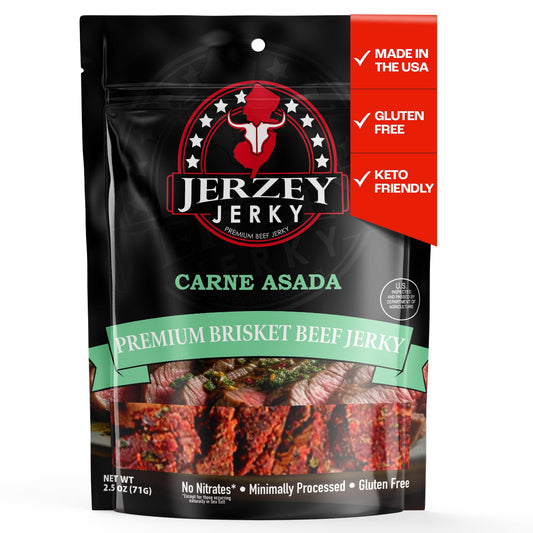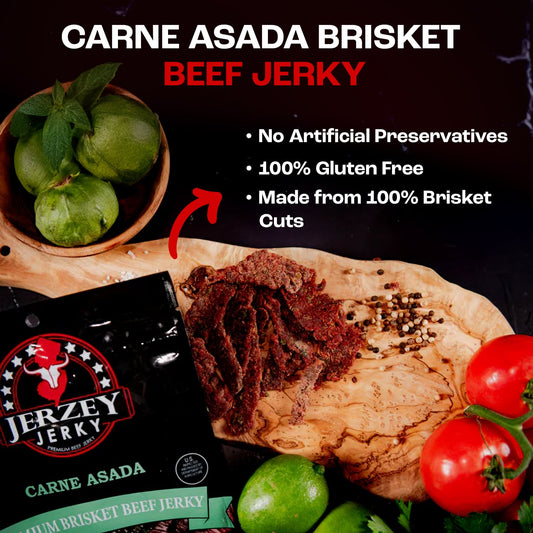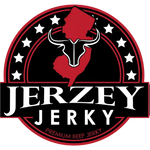
Is Beef Jerky Halal?
Beef jerky is only halal when the beef comes from an animal that has been slaughtered by a Muslim who calls on the name of Allah and drains all the blood. In addition to being free from pork, blood, alcohol and non‑halal additives. Unless they are certified, standard jerky usually does not follow these standards.
In November 2016 to October 2017, the Department of Food, Nutrition, and Packaging Sciences at Clemson University compiled 138 raw beef samples (72 halal, 66 non-halal) and investigated the samples in 2024. Halal Aerobic plate counts 4.93 log CFU/g and Non‑halal 4.92. Counts of Enterobacteriaceae were 2.89 for halal, 3.07 for non‑halal.
Halal slaughter is normally lacking in standard beef in non-Muslim markets. Beef jerky is probably produced with non-halal items unless the beef jerky is halal certified and the ingredients of the beef jerky are reviewed.
What Ingredients Can Make Jerky Non-Halal?
Here are the six ingredients that make jerky non-halal:
- Non-Halal Slaughter: Unprocessed meat that does not follow Islamic procedures is prohibited. When slaughter does not refer to the name of Allah, or when the slaughter method is improper, the meat becomes non-halal. Even beef or chicken turns non-halal when the slaughter does not adhere to these invariable Islamic regulations.
- Alcohol-Based Marinades: Wine, bourbon, or beer flavors make the jerky non-halal. These are alcohol containing ingredients that are haram in whatever way. A few drops of sauce or condiment also influence the halal status of the end product jerky.
- Pork-Derived Additives: Components such as pork gelatin or enzymes infringe on halal regulations. These chemicals are added to food as stabilizers, thickeners or flavorants. The presence of any pork-based ingredient, regardless of quantity, dictates that the jerky is no longer acceptable according to the Islamic dietary regulations.
- Cross-Contamination Risk: Halal status is compromised by the use of distributed equipment with non-halal products. It enables the transfer of impurities to occur when jerky is processed on the same lines as pork or non-halal meat. Jerky has problems with indirect contact and is not Halal without strict separation and cleaning.
- Non-Halal Flavour Enhancers: Non-halal colors include some artificial colors, emulsifiers or enzymes. These flavoring agents or preservatives find their way into food. Their presence has an impact on the status of the product regardless of whether the meat itself is halal because of the absence of a verified halal origin.
- Unlabeled Seasonings: Commercial spice mixes incorporate some traces of unacceptable chemicals. Secret ingredients are alcohol-based solvents, animal fat, or flavoring agents of pork. It is not possible to verify the halal status of seasoning mixes without detailed labeling.
Shop the best-selling Korean BBQ Beef Jerky - Brisket & Carne Asada Beef Jerky - Brisket!
How to Identify Halal Beef Jerky?
Here are the four ways to identify halal beef jerky:
- Certified Halal Labels: Seek the certification of your trusted organizations such as IFANCA, Halal Monitoring Authority or SANHA. Such labels certify slaughter procedures of halal, ingredient conformity and processing criteria. Jerky without proper certification is likely to include haram ingredients or non-halal meat.
- Cleared Ingredient Analysis: Look at labels and make sure they are not marinated with alcohol or pork-derived products or other undefined flavorings. Haram elements are usually concealed in ingredients such as gelatin or stock powder or artificial flavors. A list of components helps to make a better assessment of the halal in case of purchase.
- Reputable Halal Brands: Select reputable halal-certified or Muslim-owned jerky manufacturers to be on the safe side. These are brands that are stricter to the Islamic laws of dietary needs and tend to utilize certified halal resources. Halal practices that are consistent ensure that these suppliers are more reliable compared to non-labeled or generic ones.
- Transparent Manufacturing: Choose companies that reveal how they process and do not cross-contaminate. Transparent evidence on the use of equipment, cleaning procedures, and the locations that ingredients come from contributes to checking the halal integrity. Transparency helps meat and additives conform to accepted Islamic food practices.
Are There Halal Beef Jerky Brands Available?
Yes, certain brands focus on halal-certified jerky like Jerzey Jerky and so on.
Jerzey Jerky adopts the best grass-fed brisket free of nitrates, MSG, and artificial coloring. They have clear ingredient sourcing and a handmade small batch process, which makes greater trust towards being halal compliant.
The supreme beef jerky also provides Halal Food Standards Alliance of America HFSAA-quality jerky delivered with the aid of USDA top-grade beef. Their plants operate under halal manufacturing and do not cause cross-contamination throughout the process.
Companies such as Sharifa Halal Jerky and Halal Jerky.Co make use of 100 percent Zabiha-slaughtered meat, and carry labels of respected certifications. They reveal ingredients and processing to obtain clearance in halal assurance.
These brands are halal on the basis of certification, ingredient clarity, and the trusted sourcing of ingredients and transparent production processes.
